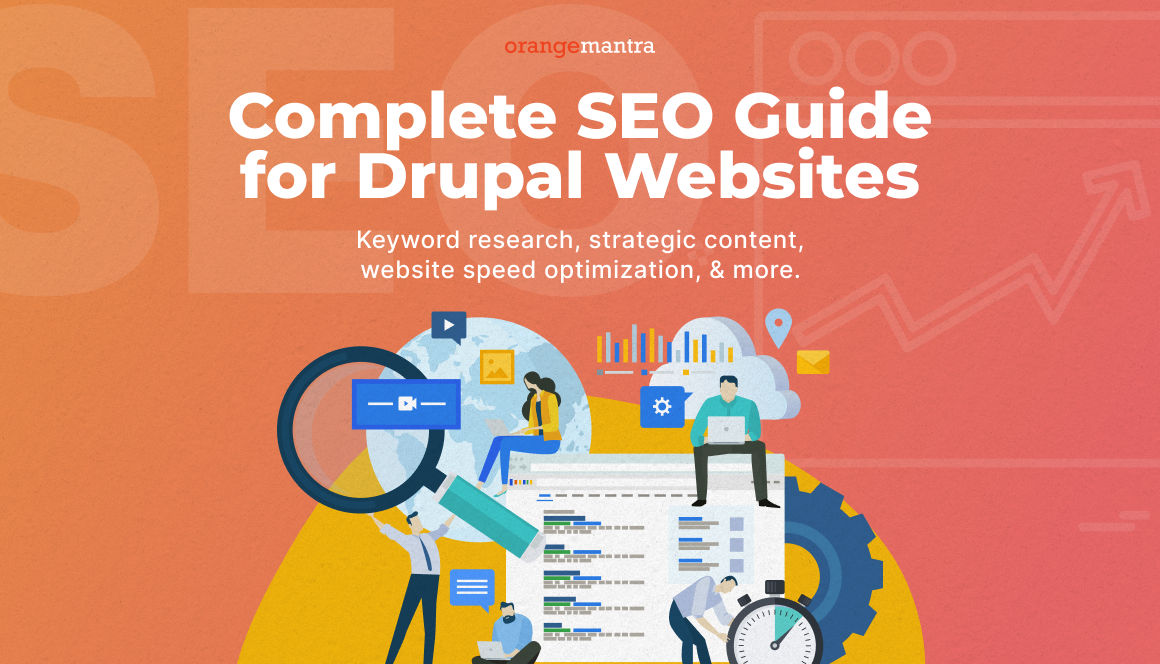
Here’s what you will learn:
Demands for grabbing attention in the digital space are at an all-time high. With 2020 accelerating ‘digital everything’- small and large businesses alike are racing for visibility. And that’s where search engine optimization comes into play. And elevating your SEO game is virtually impossible without a content management system (CMS). Drupal is one of the most reputed open-source CMS out there. With its great flexibility and power, you could achieve SEO goals and boost website traffic.
In this blog, we will discuss the complete Drupal SEO checklist that you can implement to optimize your website’s speed, search ranking, and overall digital presence. Using these guidelines, you can strategize that your Drupal website is availing the proper attention it deserves from existing customers and potential prospects.
By the end of this post, you will know some of the most effective SEO tips for enhancing digital visibility. Keep reading!
Table of Contents
How Search Engine Optimization Works
Search engine optimization (SEO) is the strategy to make your website highly visible to search engines Google, Yahoo, and Bing. When search engines know your website content, customers will reach it using relatable stuff. The higher a site ranks in the SERP, the total visits number will be higher.
There are several things to boost the search ranking of your website. The higher a site ranks in the search results list, the more relevant it is to a person’s search. The whole objective is to create the best website and then use available Drupal modules to let search engines know the website content.
Pro Tips to Improve SEO using the Drupal CMSs
-
SEO Strategy Checkup
The very first step involved is to do an SEO strategy checkup. You could use one of many easily-available tools to monitor your Drupal SEO performance and give relevant results.
Implement Google Search Console for your website to explore:
- Keywords used by people to find your website.
- Most visited pages on your website.
- Countries from where maximum traffic is coming.
- Devices used to access your website.
- The number of backlinks a website receives.
Google Search Console is a perfect way to assess and enhance your site’s SEO performance.
Another suggested module to perform SEO in Drupal is the Drupal SEO Checklist module. It provides relevant suggestions to boost SEO performance and monitors the progress track. It further does a background check for the latest updates.
-
Google Analytics
Using Google Analytics is crucial to Drupal development services and helps you obtain information about your website’s overall performance. You can gather data regarding the below points:
- Demographics of your site’s visitors.
- How do they locate your site?
- The average number of visitors coming to your website.
- The key objective of their visit.
- The time they spend on your site.
After performing all these actions, you have a relevant understanding of your Drupal website performance. Google Analytics will also give you relevant ideas on other Drupal SEO issues that need attention and proper solution from experts.
-
Keywords Research
Keywords are the most significant element of your website to rank. They give context to search engines on what your website content is. SEO managers could use different tools, like Google Keyword Planner, KW Finder, Google Trends, Moz, and Word Tracker for keyword search activity.
Building a unique page for each target keyword can lower false positives and surge the strength and effectiveness of your keywords.
-
Unique Content Creation
Another essential Drupal SEO checklist is website content. It includes all articles, photos, video content, blogs, and anything else that the user comes across.
The content helps attract visitors to your website while also offering them relevant information. Hence make sure to include new, updated, and quality content for the audience. It’s also a great idea to structure your content and organize the website information. In the long run having strategies for content management, planning, and scheduling is beneficial.
-
Appropriate Meta Tags Usage
Meta-tags are small texts displayed in grey under search listings. It is a summary of the content on a target page, giving search engines a look at the content of each page. These also show how you describe the page on other websites, especially in search results.
If you are worried about the number of pages on your website, just install the Drupal Metatag module.
- Helps to generate meta-tags for all content automatically.
- Helps to add the necessary Meta tags and Meta title to the <head> of each page.
Meta-tag supports search engines to crawl and index your website appropriately by adding a personalized description.
-
Website Speed Optimization
Search engines rank a website depending on how responsive and fast it is in navigation. You can test the website responsiveness using different online tools like Google Lighthouse, GTmetrix, YellowLabTools, and many more. As per experts, GTmetrix is the best because it gives two-speed scores and gives suggestions for speed improvements.
There are several ways to enhance the speed of your website, and some include:
- Supporting browser caching.
- Migrating to an advanced hosting service provider.
- Compressing images, both still and animated, and using the lazy-loading module.
- Background management, off-time backups, and implementing Drupal modules.
However, this phase may need more advanced hosting services with a good investment. We advise you to hire a Drupal developer from a reputed development agency to streamline the whole operation.
7. Mobile-Responsive Design
A website’s responsiveness to different screen sizes and mobile platforms is another crucial SEO ranking factor. Particularly when Google has started indexing the mobile version. You can carry out the Responsive Test and Google’s Mobile-Friendly Test to analyze how your website functions across different devices.
Drupal 7 and earlier versions need a responsive website. But Drupal 8 & 9 automatically ensure that the content is responsive and suitable across all gadgets. It will improve your SEO ranking significantly.
Our checklist is intended to guide you and serve as an easy way to make sure any Drupal site is correctly optimized for search engines.
Wrapping Up
We strongly suggest performing an SEO health check on your Drupal-based website. Ensure the site is SEO friendly to attain the maximum search engine rating. Google SERP plays a significant role in business growth.
The Drupal CMS uses modules to ensure that websites are search engine optimized. It allows us to handle all elements of the web pages with the support of pre-installed SEO automation tools, making it an SEO-friendly CMS. If you are interested in more information, our team of Drupal developers is happy to share their expertise for your website’s SEO ranking.
FAQs
What is SEO and how it works?
SEO also termed as search engine optimization, which is the process of optimizing the website to drive organic, or un-paid, traffic from the search engines. In order to perform this, search engines will scan, or crawl, multiple websites to understand what the site is all about.
What is SEO friendly web page?
SEO web design is a way of designing and developing websites to make them search-engine friendly. Making a website SEO-friendly means that Google and other search engines can crawl each page on the website efficiently, interpret the content effectively, and index it in their database.
Can digital marketing services help with Drupal SEO?
Yes, digital marketing services often include Drupal SEO as part of a comprehensive strategy that enhances visibility, user engagement, and lead generation.
How many keywords do you need for SEO?
At the bare minimum, one; some pages may have a singular focus that answers only one query. It’s much more likely that you’ll want to target two or three keywords per page, even if they’re just close variations. Any more than four is a bit crowded; after all, each page only has one title tag and Meta description.
What keywords should I use for SEO?
Long tail keywords are long terms that searchers use in Google and other search engines. And they tend to have a lower keyword difficulty compared to 1-3 word “head terms”. So, for people that are new to SEO, long tails are usually the best keywords to start with.
How do I write SEO friendly content?
Writing tips for SEO-friendly blog posts
- Research before you write
- Devise a structure for your post
- Use paragraphs and headings
- Use transition words
- Use related keywords
- Optimize the length of your article
- Link to existing content
What are modules in Drupal?
A Drupal module is a collection of files having some functionality and is based on the PHP language. Because the module code executes within the website context, it can use all the functions and access all variables of Drupal core.
Do I need professional SEO services for my Drupal site?
If you’re aiming for consistent traffic growth and higher search rankings, professional SEO services ensure your Drupal website meets all technical and content-related SEO standards.


